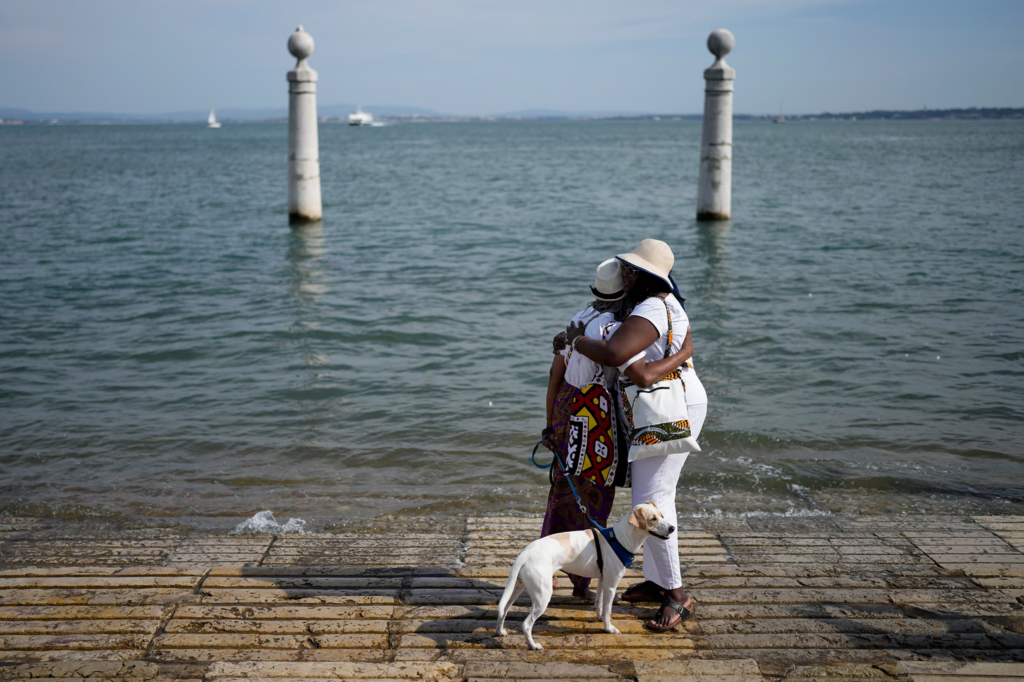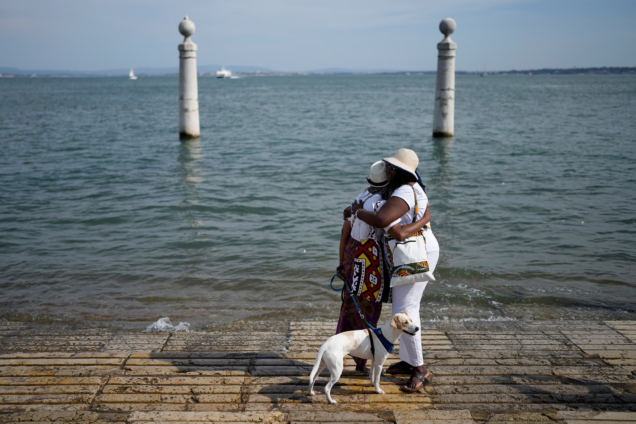
Audio By Carbonatix
In Lisbon’s bairro das novas nações, the neighbourhood of new nations, each street is named after a former Portuguese colony: Rua de Angola, Rua de Moçambique, Rua da Guiné, Rua de Cabo Verde.
“Ah, Cabo Verde,” I say to my guide, Djuzé Neves, “your homeland.”
Though that’s not entirely accurate—Neves was born and raised in Lisbon—his parents hail from Santiago Island, the largest in the Cape Verdean archipelago.
Climate refugees fleeing drought found solace in Lisbon’s embrace.
For Neves, this neighbourhood embodies more than just geography; it’s a beacon of community-driven resilience. As a board member of Batoto Yetu, an organisation nurturing African heritage among underprivileged youth, Neves invests his time in cultivating cultural pride.
I’ve come to Lisbon exactly for neighbourhoods like novas nações, a liberating space to escape the rising tide of racial and political stress I’ve been experiencing in the United States. I’m not alone.
On social media, countless Black travellers share tales of feeling marginalized and impotent in the face of systemic racism and police brutality, prompting a surge in overseas travel in search of historical significance, cultural diversity, and a relaxed atmosphere.
I’ve come to Lisbon exactly for neighbourhoods like novas nações, a liberating space to escape the rising tide of racial and political stress I’ve been experiencing in the United States. I’m not alone.
On social media, countless Black travellers share tales of feeling marginalized and impotent in the face of systemic racism and police brutality, prompting a surge in overseas travel in search of historical significance, cultural diversity, and a relaxed atmosphere.

It’s not new, this practice of African Americans traveling to foreign lands for a respite from the challenges and frustrations that come with being Black in America. In the 1920s and ’30s, the Soviet Union became an attractive place to visit and explore because it promised a raceless, classless society. In Lisbon and other cities such as Paris, Dubai, and Amsterdam, travelers find memorials and tours that acknowledge the trauma of the slave trade and programs that explore cultural heritage.
Where the slave trade started
I meet Madisyn Brown, a Black 22-year-old video essayist, on the flight from New York to Lisbon. She tells me that her great-great-grandmother was from Portugal. “But no one in my family has been to Portugal despite that connection,” she says.
On the final day of her trip, I reconnect with Brown for a drink on Avenida da Liberdade, a sun-drenched, tree-lined street with wide sidewalks featuring black, white, and sometimes gray limestones mosaics, called calçada Portuguesa. Avenida da Liberdade is Lisbon’s version of Paris’ Champs-Élysées, London’s Regent’s Street, and Beverly Hills’ Rodeo Drive.
Brown says her time in Lisbon has been magical. “I felt like a normal person walking through the world,” she says. “I never felt like I didn’t belong. I’m going to miss the positive energy here. America can be a really tough place to live.”
The irony isn’t lost on me—seeking solace in a city with ties to the very institution of slavery that shaped our history. We’ve learned to associate many European nations with colonialism, but Americans are not as familiar with Lusophone culture and history.
Many of us were unaware that Portugal was not just a participant in colonialism; it pioneered the trade in chattel slavery. In 1444, the small nation began transporting sub-Saharan Africans to Europe. In 1526, Portugal transported its first shipment of enslaved people to Brazil, effectively launching the transatlantic slave trade.
Yet, perhaps our modern “return” to Portugal signifies a crucial step in healing, a reclaiming of collective joy and freedom.
Toby Thompkins, a recent ex-pat from New York, sees Lisbon as a place of reconciliation. “I think that’s what a lot of Black Americans are tapping into,” he says, adding there’s an openness to dialogue and a sense of infinite possibilities, reminiscent of America in the 1970s—a time of acknowledging and confronting racism.
How to experience Lisbon
To address its role in the slave trade, Lisbon’s government, in association with Batoto Yetu, has erected more than 20 historical street markers to honor the contributions of Africans and their descendants in 2024.
Travelers can find the plaques near the riverside Terreiro do Paço, where enslaved people disembarked from the ships that carried them there from Africa, or in places such as Rossio Square, which, for centuries, has been a traditional gathering place for Black people in Lisbon. It is also the location of Igreja de São Domingos, the church where enslaved Africans were taken for their requisite baptism.
In the Largo São Domingos neighborhood, which has a sizable African population, a stone bust was unveiled of Paulino Jose da Conceiçao, a formerly enslaved African who emigrated to Portugal from Brazil in 1832. Da Conceiçao, also known as Pai Paulino, was a social justice advocate and worked to improve the working and living conditions of Africans in Lisbon. Also in the works is a memorial to the victims of slavery, the first of its sort there.
In the coastal city of Lagos, in the Algarve region of southern Portugal, about three hours by train from Lisbon, visitors can explore a small museum dedicated to the history of slavery in the town. The museum, Mercado de Escravos, Market of Slaves, is situated on the site where the very first group of enslaved Africans was sold.
Latest Stories
-
Beyond Witchcraft: Why preparation, not spiritual fear, determines success
54 seconds -
Margaret Korme Tetteh
39 minutes -
Sammy Gyamfi’s work at Goldbod in few months would take someone five years – Ato Forson
54 minutes -
From Accra to Wuzhen: The Ghanaian schoolgirls making their mark in global AI
56 minutes -
Ghana must prioritise value addition to sustain IMF gains – Prof Asuming
1 hour -
Man allegedly poisons his incoming girlfriend over GH₵100 at Buduburam
1 hour -
Jennifer Frimpong: Ghana’s health system faces funding shock, urgent reforms needed
1 hour -
Tighter cocoa supply lifts prices as Ghana records good crop conditions
2 hours -
KAAF University donates to Widows, urges Public to end Discrimination against Elderly Widows
2 hours -
NAIMOS task force disrupts illegal mining operations along Ankobra River
2 hours -
President’s New Year message lacked hope and sincerity – NPP’s Senyo Amekplenu
3 hours -
Ebo Noah remanded pending psychiatric exam, to reappear on January 15
3 hours -
Our public university system is falling down
3 hours -
Ho Central Mosque under heavy security, worshippers forced to pray outdoors
4 hours -
An open letter to H.E. John Dramani Mahama: The audacity of the third shift
4 hours

